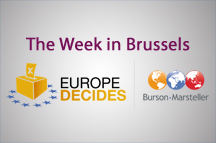 It’s all over – and heads are being scratched in London and Brussels.
It’s all over – and heads are being scratched in London and Brussels.
In London, the feeling is ‘how did that happen?’
Pre-election opinion polls foresaw an extremely close-run election, and a post-election battle for legitimacy and coalition partners. But, at 10pm, the broadcasters’ exit poll painted a different - perhaps incredible - picture. The Conservatives would be the largest party and David Cameron would probably return as Prime Minister. The results turned out even better for the Tory leader - he looks set to win an overall majority, albeit small.
In Brussels, the feeling is ‘what happens now?’
 The return of a sitting Prime Minister to the European Council table after an election is often met with relief - better the devil you know. But the likely return of David Cameron brings a mandate for his ‘renegotiation and referendum’ approach to the United Kingdom’s EU membership. Freed of his more Europhile Liberal Democrat coalition partners, Cameron is likely to guide a bill promising a referendum in 2017 through the House of Commons. Additional support will come from eight Northern Irish Democratic Unionist Party MPs, plus UKIP, and Labour rebels.
The return of a sitting Prime Minister to the European Council table after an election is often met with relief - better the devil you know. But the likely return of David Cameron brings a mandate for his ‘renegotiation and referendum’ approach to the United Kingdom’s EU membership. Freed of his more Europhile Liberal Democrat coalition partners, Cameron is likely to guide a bill promising a referendum in 2017 through the House of Commons. Additional support will come from eight Northern Irish Democratic Unionist Party MPs, plus UKIP, and Labour rebels.
The next two years will be dominated by the European question - remarkable after an insular general election in which the referendum - indeed, foreign policy at all - was conspicuous by its absence. UKIP, who won about one in eight votes, highlighted membership of the EU as the root cause of many of Britain’s ills. But specific EU issues - such as the EU-US trade deal, known as TTIP, and its possible impact on public services, were largely ignored.
The next move is for EU leaders
Not only the key figure of Angela Merkel, the German Chancellor, but also Jean-Claude Juncker, the European Commission President, and Donald Tusk, the European Council President.
 So far, Juncker has suggested only ‘tweaks’ to Britain’s terms of membership, on issues such as freedom of movement, but no treaty change. Merkel and the French President, François Hollande, have elections in 2017 and are unlikely to want to re-open the treaties. But Eurosceptic Tory MPs are likely to push for this option, and hard - using the power that a tiny Conservative majority gives them. Senior Conservatives are already talking of a ‘mandate for change’ in the EU.
So far, Juncker has suggested only ‘tweaks’ to Britain’s terms of membership, on issues such as freedom of movement, but no treaty change. Merkel and the French President, François Hollande, have elections in 2017 and are unlikely to want to re-open the treaties. But Eurosceptic Tory MPs are likely to push for this option, and hard - using the power that a tiny Conservative majority gives them. Senior Conservatives are already talking of a ‘mandate for change’ in the EU.
David Cameron may no longer be able to pursue a de minimis strategy - getting just enough power ‘back from Brussels’ to appease public opinion and win a referendum. But leaders lose control of referendums. It is a dangerous game, even if a poll this week suggested greater popular support for membership (and falling support for a referendum). Get it wrong, and Britain could leave Europe (and a pro-EU Scotland could subsequently leave the UK).
Talk of Brexit and Cameron’s potential demands has just got very real. Changes in benefits rules are likely to be part of the equation. Plans to remove red tape are already underway. TTIP is being negotiated. There is little appetite to increase fundamentally the EU’s powers. In many ways, the EU is moving in Britain’s direction. But the UK’s newly-restored PM needs to be able to secure changes and sell them to the British people.
Those scratched heads in Britain, Berlin and Brussels need to come up with the answers, and quickly.














